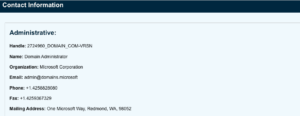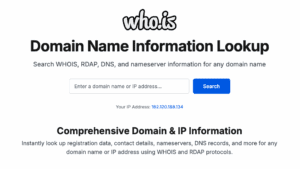
Domain Buying Guides
-
How to Buy a Domain Name
-
How to Buy a Domain Name Owned by Someone Else
-
Negotiating a Domain Price
-
What is a Premium Domain Name & Why You Should Buy One
-
How to Choose a Domain Name
-
How to Value a Domain Name
-
Domain Names for Startups
-
How to Buy a .com Domain Name
-
Things to Watch Out for When Buying a Domain
-
Domain Name Investing
-
Buy & Selling Domains
-
Best Domains to Buy
Name Experts provides premium
domain service to:
Domain brokers like NameExperts.com help clients buy ‘premium’ domains – but what is a premium name, and how do you get one? In this post, domain name specialist Joe Uddeme lifts the lid on high-value web addresses.
Imagine a business today that didn’t have a website. Seems almost inconceivable, right? The internet is one of a business’ primary channels to entice potential customers, meaning any organization that doesn’t have an online presence is massively missing out.
The best way to showcase yourself online is by having a website stating clearly what you or your organization offers. And the way to do that? With a premium domain name.
The domain name is how people will find you on the web, so unless you strike it luck and some cheap random jumble of letters you’ve bought as a domain name suddenly becomes in vogue, you’ll need to dig deep and buy a premium domain name.
But what are the elements of a premium domain – and how much are you going to have to pay? Read on for the full details.
Key Takeaways
- Understanding what premium means in the domain name world
- Elements of a premium domain
- How to buy a premium domain name
- Why you should buy a premium domain
What are Premium Domains?
Premium domain names are high-quality domain names, giving you greater recognition on the internet. They’re often short, catchy, and memorable. They’re the domain names that people are likely to search for and trust over other names.
A premium domain name would go a long way in drawing organic traffic to your website. They’re usually costly, but one of the best investments you can make.
It’s not a coincidence that most of the successful online businesses we know have premium domain names – see Stripe.com, Amazon.com, Google.com and other big-hitters.
Need help buying a domain? We make the domain buying process easy.
How Do You Know if a Domain Name is Premium?
The easiest way to determine if a domain name is premium is the price you see when you search for it for a domain registrar. Likewise, you can use a premium domain checker for this task.
Premium domain names often range from a few hundred dollars to thousands or tens of thousands. They can go for even larger sums – as our post about the most expensive domains ever sold illustrates.
There are also specific characteristics differentiating premium domain names from the pool of all domains, and they include:
Length
“The shorter the name, the better” is the rule of thumb when it comes to domain names. Most two or three-letter domains are considered premium because they’re easy to imprint on customers’ minds.
These short names are also usually abbreviations adopted by various companies, so there’s intense competition for them.
Generic Value
Domain names consisting of generic words fetch a higher value than those with non-generic words. Generic names are easy to remember and brand, so there’s significant demand for them.
You’d have an advantage over competitors if your domain name consists of a word that broadly relates to your industry.
For example, Checkout.com, Bill.com, and Authorize.net are leading payment providers. Crypto.com and Blockchain.com are two famous cryptocurrency exchanges.
Customers need little effort to memorize such generic domain names, so it gives these companies a significant marketing advantage compared to their peers.
Search engine optimization
Search engines are the primary way people discover websites. Hence, any domain name matching what people mostly search for carries more weight.
CreditCards.com, HouseRepairs.com, and RentalCars.com are examples of domain names with high value stemming from search engine optimization.
Buyer Demand
Some domain names don’t look attractive at first glance but see great demand from prospective buyers for various reasons. These domains command high values because of the bidding war over them.
Numerous domain registrars let you check for available domain names, and it’s easy to identify the premium ones based on their prices and the other factors stated above.
If the domain name you want is already taken, don’t give up. You could still acquire it by making a direct offer (more on that below).
How Do You Get a Premium Domain?
The first step to buying a premium domain name is knowing if it’s available using a premium domain checker. You can buy it straight away if it is. If not, you’ll need to find the owner.
Many domain names are registered but not utilized to a considerable extent. Sometimes, you’ll see a homepage filled with advertisements and affiliate links but hardly any content.
This is an attempt by the owner to monetize what’s basically an abandoned site. If you encounter such a website, then it’s positive news for you. The owner is more likely to sell than someone actively hosting a site and doing good business.
If the website has a contact form, you can use it to reach out to the owner with an offer. If not, you must get creative in finding them. The easiest way to do this is through the WHOIS database.
It is a public database containing the information collected when someone registers a domain name or adjusts their DNS settings. ICANN, or the International Corporation for Assigned Names and Numbers, regulates the WHOIS database.
Searching the WHOIS database
ICANN allows anyone to search its public database for domain name ownership information. You can do that through the agency’s online lookup tool or your PC’s command prompt.
Searching WHOIS Online
The official URL of ICANN’s WHOIS lookup tool is lookup.icann.org. Once you open that page, you’ll see a search bar where you can type in any domain name and press the lookup button. We searched for Microsoft.com to demonstrate, and we got the results shown below:

You can see the email assigned to Microsoft’s domain name is [email protected]. Hypothetically, we can contact that email with an offer for the Microsoft.com domain name, but we’re pretty sure the well-known technology company isn’t willing to sell.
Searching WHOIS via Command Prompt
Searching WHOIS through your Windows command prompt is a complex process, so we recommend that only computer geeks take this route.
Step 1:
Download the whois.exe file from this link.
Step 2:
Open the command prompt terminal.
Step 3:
Set the command prompt directory to the folder where you save the whois.exe file.
Step 4:
Type in your query in the following format: Whois domain.com or Whois64 domain.com if you’re running a 64-bit computer. If you want to search for Microsoft’s domain name info, then type Whois Microsoft.com, and you’ll see the contact information.
Sometimes, a domain name owner may have enabled privacy protection through their registrar, meaning you can’t see their information. It implies that they’re likely not interested in selling their domain.
With the contact information, it’s time to negotiate a domain name sale. The process can be hectic and take long periods, so we advise you to hire an experienced domain name broker to help you.
Why Should I Buy a Premium Domain Name?
A premium domain name carries more authority on the web, meaning you’re more likely to get found through search engines or social media. It also brings about better brand recognition, making it easy to attract customers through advertisements.
Many domain registrars have a premium domain checker for their users to find and bid for premium domains without stress. Examples include Name.com and Domain.com.
Who Owns Premium Domain Names?
Anybody or any organization can own a premium domain name. Some are owned by business-savvy people or companies looking to flip them for a profit. Some are owned by domain name registrars themselves hoping to find buyers.
How Do You Value a Premium Domain?
There are various factors to consider when valuing a domain name. They include length, how generic they are, search engine recognition, and historical domain name sales data.
There are numerous appraisal tools available online that combine these attributes to value individual domain names. A good example is GoDaddy’s Domain Name Value & Appraisal tool.
Why are Premium Domains So Expensive?
The price of premium domains can be high because there’s considerable demand for them. The number of premium domain names is significantly less than the number of potential customers vying for them. Hence, premium domain owners can charge high prices and still make easy sales.
As professional domain name brokers, this is the world we live in – and we help people buy and sell premium domains globally every week. Clients choose us for our years of experience – it means we can help them get hold of names that seem impossible to purchase.
Our expert negotiation skills often save clients large sums of money, too.

About the author
Joe Uddeme is Director and Principal of Name Experts, one of the world’s leading domain name brokerage services. He has overseen domain name sales and acquisitions totaling more than $150 million and is renowned worldwide as a go-to expert in buying and selling premium domains. Contact us at: [email protected]
Need help buying a domain? We make the domain buying process easy.
Subscribe for More Domain Buying & Selling Advice
Related posts


How We Helped Monday.com Secure the Perfect Name for their Rebranding
Discover how Name Experts’ premium domain buying service played a key role in the rebranding of Monday.com. As the business goes from strength to strength, Monday’s rebranding is a testament to the power not just of a world-class brand name but of a powerful, memorable domain name, too. We’ve all heard of Monday.com. They are one of the biggest project management tools on the market. But that was not always the case. Before Monday.com was Monday.com, they were daPulse, a name that ultimately was a hindrance to their growth. The daPulse name was out of sync with the project management business and limited their ability to scale. Changing to Monday.com was a sound decision that contributed to the company’s massive success. It demonstrates how naming a brand is as essential as product development to any technology business. I was approached by the two founders, Eran Zinman and Roy Mann, to pursue a rebranding project. They wanted to buy a domain name that was both generic and memorable. One that ended in .com and could be used as a solidified brand. One of the names that stuck early on was Monday.com. After contacting the owner, the domain name negotiation and engagement was flawless, and ultimately, Eran and Roy were ecstatic with the result. Early on, however, I remember some of the feedback was, “What the heck is Monday.com?” But, with fantastic brand marketing, the team has done an exceptional job at growing and scaling the company. As with most great business ideas, it all starts with the foundation or a solid domain name asset to help build a brand. Here’s the story… In 2012, a group of Israeli entrepreneurs launched a company named daPulse. daPulse launched as a platform for enterprises to organize project management and collaboration between their workers. Though it started in 2012, daPulse didn’t launch commercially until 2014 after significant product testing and development.

Stealth Acquisitions Domain Name
Some domain acquisitions are straightforward, but others are less so. Joe Uddeme, Director of NameExperts.com, explains what happens when a client wants a domain that seems out of reach – and they want to keep their name out of the picture, too. As a buy-side broker specializing in stealth acquisitions, it’s our job to dig deep and find the rightful owner of a domain name while protecting the identity of the buyer. The problem is that some domain owners make it very difficult to reach them. What’s the psyche behind this rationale? For a start, not all domain name owners are equal; some just don’t want to be contacted or have zero interest in selling their domain name. Or perhaps it’s just a case that their whois information is out of date – making it difficult to decipher the current domain owner. GDPR is another major change. Many countries now adhere to stricter policies related to domain name owner privacy, with many whois entries now redacted for owners’ privacy rights. But all is not lost. Quietly tracking down “unreachable” domain owners and securing them for anonymous clients is what we do best. And we can do it for you. Key Takeaways What your broker needs to know to get started Buying a domain name – what you need to know How to choose a stealth acquisition broker Stealth acquisitions – what to do first Stealth acquisitions represent an opportunity for a buyer to be protected by complete anonymity. You should understand this before reaching out to a broker, as you need to have an idea of what will happen next. Try and answer these questions BEFORE making contact: Have you completed a relevant trademark search around the keyword in question? Have you established a budget to complete this potential acquisition? Have you established a timeline for this potential acquisition? Are you familiar with aftermarket domain name valuations? Have you thought about viable alternatives if your target might not be available? What type of barriers do you see in this potential acquisition? Buy-side brokers need to understand the full story about why you want this domain and anything you have done so far to try and get it, including previous acquisition attempts. They will then attempt to drill down into the fine details and identify – and contact – the rightful domain name owner. The buy-side broker should also be able to act as a buffer between buyer and seller and remove any emotion from a potential deal. Buying a domain name – the steps involved Here are the basic steps to acquire a domain name: Identify ownership and research if the name is available Submit an offer to the owner Negotiate Agree on the price and complete paperwork (if applicable) Set up Escrow for payment Registrar transfer via push or authorization code Confirm control of the name Release funds Tools to try if you’re trying to track down an owner yourself: Check the DNS and see where the domain is pointing to. Is there a website, or is it undeveloped? Whois history is a valuable tool to understand the true history of the domain name. Check the Wayback Machine to see what other properties have been developed on the URL in the past. If working with a buy-side broker, they should offer the following upside for any stealth acquisitions: Negotiate with YOU in mind; no dual agency in this scenario. Provide contracts that protect ALL parties involved. Typically save you time and money. Allows for a third-party (non-biased) approach towards the acquisition. Coordinate necessary contractual paperwork between parties. Facilitate and handle smooth transfers of domain names. Offer transparency and full disclosure. Non-disclosure where applicable. How to choose a broker for your stealth acquisition Start by researching suitable candidates to help with your domain name acquisition. Don’t identify the asset unless you are sure you have found the buy-side broker you’re certain you want to work with. Ask the broker for information about their service and a few names they recently acquired for clients. Find out how your broker can add value to your potential acquisition; always do a Google search to learn more about the broker you are working with. Take the time to find an expert that can properly assist you with all of your acquisition needs. Ask lots of questions and make sure you feel aligned with the broker. Hold the broker accountable and require status updates so you aren’t left in the dark as they progress. In most instances, your stealth acquisition needs to be completed right the first time. Most domain name acquisitions only have one chance to secure the domain name target without leaving extra money on the table. Stealth acquisitions should only be performed by a seasoned domain name buy-side broker, so choose your broker carefully. You should understand if the broker has certain strengths or weaknesses. Some buy-side brokers don’t have the tools or knowledge to find the rightful domain owner. Or they lack rich relationships with industry veterans. Other buy-side brokers are excellent at managing the acquisition but terrible at the details. Details are key when it comes to any domain name acquisition. Contracts and paperwork can take months to pass through the legal channels, so it’s important to find a representative that is fully vested and can assist you with all aspects of the buy-side domain name acquisition process. Finally, when selecting a buy-side broker, make sure you ask for referrals so you get a feel for how they work. Once you have faith in your broker you can instruct them to make contact with the rightful domain owner and secure the perfect domain name for your brand. About the author Joe Uddeme is Director and Principal of Name Experts, one of the world’s leading domain name brokerage services. He has overseen domain name sales and acquisitions totaling more than $150 million and is renowned worldwide as a go-to expert in buying and selling premium domains. Stealth acquisitions are his specialty. Contact us at: [email protected]
Why Work with Name Experts
Name Experts offers personalized domain brokerage services, assisting clients in buying or selling premium domain names with expert appraisal, negotiation, and complete transaction management while ensuring confidentiality.
Some of our most
successful stealth acquisition and sales

